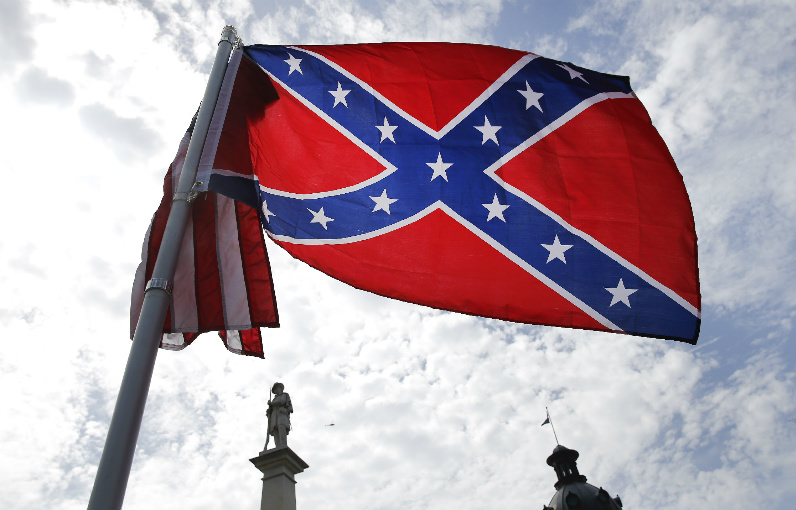South Carolina’s Confederate Flag: Bringing Down a Twisted Fantasy
For most of my life, a flag representing white supremacist violence against black people flew at the capitol of my native state. It is a very big deal that this emblem of hatred and oppression is finally coming down. The Confederate battle flag in front of the South Carolina Statehouse in Columbia, S.C. (John Bazemore / AP)
The Confederate battle flag in front of the South Carolina Statehouse in Columbia, S.C. (John Bazemore / AP)
For most of my life, a flag representing white supremacist violence against black people flew at the capitol of my native state. It is a very big deal that this emblem of hatred and oppression is finally coming down.
Gov. Nikki Haley was expansive after the state Legislature finished action early Thursday on a bill consigning the Confederate battle flag to the museum displays where it belongs: “It is a new day in South Carolina, a day we can all be proud of.” I have to entertain the notion that she may be right.
In the South, William Faulkner wrote, the past isn’t even past. The flag represented, for some white South Carolinians, a past that was invented out of whole cloth — a past in which something other than slavery was the cause of a conflict Southerners called the “War Between the States.”
READ: How Endless War Helps Old Dixie Stay New
In truth, the Civil War was only about states’ rights in the sense that the Confederate states feared losing one specific “right” — to own human beings and compel their labor. No amount of Spanish moss can obscure this basic fact. No paeans to the valor of Confederate soldiers can change the fact that they were fighting for slavery.
And no amount of revisionist claptrap can change the fact that the flag was hoisted at the capitol in Columbia in 1961 and kept flying not to honor some gauzy vision of Southern valor but to resist the dismantling of Jim Crow segregation. The flag meant whites-only schools, whites-only public accommodations, whites-only voter rolls. It represented white power and privilege over subjugated African-Americans. It was used by the murderous terrorists of the Ku Klux Klan — and by an ignorant young white supremacist who took nine innocent lives at Charleston’s Emanuel African Methodist Episcopal Church.
Haley, who is Indian-American, made possible the “new day” she now proclaims by demanding that the state Legislature vote to banish the flag. But it was another woman — Republican state Rep. Jenny Horne — who guaranteed success with a powerful speech telling her colleagues that enough was enough.
“I cannot believe that we do not have the heart in this body to do something meaningful, such as take a symbol of hate off these grounds on Friday!” Horne thundered. She wasn’t having any of the “noble heritage” cornpone that flag apologists were selling; Horne is a descendant of Confederate President Jefferson Davis, she said, and still she knew it was time for the flag to come down.
Before Horne’s intervention, it looked as if the state House might cave to the latter-day Johnny Rebs who were seeking to stall the legislation into parliamentary oblivion. Afterward, it still took hours of contentious debate but the House passed the bill around 1 a.m. and Haley signed it into law Thursday afternoon.
It was an acknowledgement, in the state where the Civil War began, that the South lost not only the war but also the battle to rewrite history.
For 150 years after Appomattox, the states of the Confederacy lived a twisted fantasy. As evidenced by the diehards in the South Carolina Legislature, some white Southerners still refuse to wake from the reverie. But the rest of the state has finally moved on.
Does this mean that South Carolina and other former Confederate states will take a new look at all the monuments and memorials dedicated to white supremacists who advocated slavery and fomented armed rebellion against the United States? Does it mean Southern towns will pull down all those town-square statues of rebel soldiers, their backs defiantly turned against the north?
Probably not, or at least not anytime soon. Emanuel A.M.E. Church is on a street named for John C. Calhoun, the South Carolina “statesman” who defended slavery not as a necessary evil but as an absolute good, and who laid the philosophical groundwork for the treasonous act of secession. I’d love to see Calhoun Street renamed after the Rev. Clementa Pinckney, the pastor who perished in the Emanuel massacre, but I don’t expect that to happen.
The flag is more important, though, because of the way it has been used — not just as an instrument of repression but as a way to deny history and thus avoid history’s judgments and responsibilities. What South Carolina’s governor and Legislature have announced is clear: It’s time, finally, to stop pretending.
Symbols matter. South Carolina should have brought down the Confederate battle flag long ago, but I’m proud that my home state is doing it now.
Eugene Robinson’s email address is [email protected].
© 2015, Washington Post Writers Group
Independent journalism is under threat and overshadowed by heavily funded mainstream media.
You can help level the playing field. Become a member.
Your tax-deductible contribution keeps us digging beneath the headlines to give you thought-provoking, investigative reporting and analysis that unearths what's really happening- without compromise.
Give today to support our courageous, independent journalists.






You need to be a supporter to comment.
There are currently no responses to this article.
Be the first to respond.